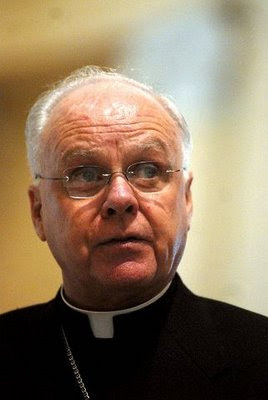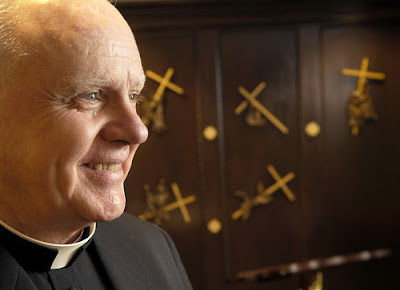For "Premier" Prelate, A "Grand" Finale -- Baltimore's O'Brien to Head Holy Sepulchre
 As Hurricane Irene strikes the Eastern seaboard, the weather's brought a fitting parallel on the church-beat: according to multiple reports, one of the Stateside church's top rank is about to be swept across the Atlantic.
As Hurricane Irene strikes the Eastern seaboard, the weather's brought a fitting parallel on the church-beat: according to multiple reports, one of the Stateside church's top rank is about to be swept across the Atlantic.
As soon as Monday, Whispers has learned that Pope Benedict is set to name Archbishop Edwin O'Brien of Baltimore, 72, as Pro-Grand Master of the Equestrian Order of the Holy Sepulchre of Jerusalem.
By long-standing tradition, the "Pro-" designation indicates that an archbishop-holder of the Rome-based post is placed at the front of the line to receive the red hat of a cardinal at the next consistory, at which point the prefix disappears.
Sent to the nation's Premier See in 2007 after a decade at the helm of the 1.5 million-member archdiocese for the Military Services, the Bronx-born prelate would become the second American in a row to head the ancient order, following Philadelphia's iconic Cardinal John Foley, who retired in February due to the acceleration of the leukemia he was diagnosed with in 2009, and the anemia that's limited his energy and movement. While Foley had been the first non-European to preside over the thousand-year old association dedicated to the support of the sacred sites and small Christian community in the Holy Land, a plurality of the Holy Sepulchre's global cadre of knights and dames live on these shores.
The order's base located just down the Via della Conciliazione from the Vatican, the reported move would return O'Brien to cherished old stomping grounds -- the archbishop served as rector of the Pontifical North American College from 1990-94 and earned a doctorate in theology from the Angelicum in 1976.
 Above all, the unprecedented nod for a residential archbishop -- until now, Holy Sepulchre chiefs have invariably come from the ranks of the Roman Curia or Holy See diplomatic corps -- would stand as a substantial tribute to the Charm City prelate's record of distinguished service to the wider church, most notably in overseeing the 2005-6 Apostolic Visitation of US seminaries at the Vatican's behest. It's likewise a pointed vindication of O'Brien's 2008 move to take on the now-scandal scarred Legionaries of Christ, whose activity in Baltimore was placed under significant restrictions by the archbishop, but only after he was persuaded by a senior Curial official out of his initial thought to expel the community's clerical and lay apostolates from the Premier See.
Above all, the unprecedented nod for a residential archbishop -- until now, Holy Sepulchre chiefs have invariably come from the ranks of the Roman Curia or Holy See diplomatic corps -- would stand as a substantial tribute to the Charm City prelate's record of distinguished service to the wider church, most notably in overseeing the 2005-6 Apostolic Visitation of US seminaries at the Vatican's behest. It's likewise a pointed vindication of O'Brien's 2008 move to take on the now-scandal scarred Legionaries of Christ, whose activity in Baltimore was placed under significant restrictions by the archbishop, but only after he was persuaded by a senior Curial official out of his initial thought to expel the community's clerical and lay apostolates from the Premier See.
The only American bishop who's served as rector of two seminaries, O'Brien is already a member of the Congregation for Catholic Education, the Vatican dicastery that oversees formation houses.
The 14th successor of John Carroll at the helm of the nation's mother-diocese, O'Brien spent the early 1980s as priest-secretary to Cardinals Terence Cooke and John O'Connor and subsequently the spokesman for his native archdiocese of New York, then embarking on the first of two tours as rector of the Big Apple seminary, St Joseph's at Dunwoodie, holding the post both before and after his four years at the NAC -- a place which, according to friends, "he's never left" in his heart.
On his second Dunwoodie stint, O'Brien was named an auxiliary of New York months after he welcomed Blessed John Paul II to the Yonkers house on the late Pope's October 1995 visit to the Northeast. (During the latter tenure, O'Brien ordained Eugene Hamilton -- one of his seminarians stricken with terminal cancer -- to the priesthood hours before the young man succumbed at 25.) Barely a year later, the veteran of Army chaplain's duty at West Point and in Vietnam was named coadjutor-archbishop of the 1.5 million-member church comprising the nation's servicemen and women and Federal government workers around the globe, succeeding to the Washington-based AMS' command within months.
Notably, word of the appointment has arrived weeks after the archbishop made national headlines for his public confrontation with Maryland Gov. Martin O'Malley -- a Catholic Democrat -- over the latter's move to support a bill legalizing same-sex marriage in the Free State.
In an exchange of letters, O'Brien accused O'Malley of "mere political expediency" in backing a gay marriage measure for the upcoming legislative session, saying that the governor was "promoting a goal that so deeply conflicts with [his] faith." In response, O'Malley said that while he wouldn't "ever" seek "question or infringe upon [O'Brien's] freedom to define, to preach about and administer" the sacraments, "on the public issue of granting equal civil marital rights to same sex couples, you and I disagree.
"As Governor," O'Malley added, "I am sworn to uphold the law without partiality or prejudice."
While the governor's stance in support of legal abortion has likewise clashed with church teaching, the archbishop has never publicly attempted to withhold the Eucharist from O'Malley, or any pro-choice public official in heavily-Democratic Maryland.
At the same time, acknowledging that he was "something of a late-comer" to understanding the Magisterium's position on capital punishment, in 2009 O'Brien testified before the Maryland legislature to support a state moratorium on the death penalty, saying that "our church’s long-standing advocacy" on the issue "rests upon our consistent advocacy for laws that respect all human life -- even that of the convicted criminal." To boot, the former Military-church chief has repeatedly argued over recent years for the US' nuclear disarmament, terming the persistance of atomic weapons a "disproportionate and indiscriminate threat to human life” during a 2010 talk in Washington.
 O'Brien would be the third resident American archbishop to be called to a Vatican post by Benedict, following William Levada's 2005 transfer from San Francisco to lead the Congregation for the Doctrine of the Faith, and Raymond Burke's 2008 elevation from St Louis to the helm of the Holy See's "supreme court," the Apostolic Signatura.
O'Brien would be the third resident American archbishop to be called to a Vatican post by Benedict, following William Levada's 2005 transfer from San Francisco to lead the Congregation for the Doctrine of the Faith, and Raymond Burke's 2008 elevation from St Louis to the helm of the Holy See's "supreme court," the Apostolic Signatura.
Both Levada and Burke were made cardinals at the first consistory to follow their respective appointments. Accordingly, at the college's next intake -- most likely to occur late next year -- the Holy Sepulchre nod would continue Benedict XVI's consistent practice of splitting the US' traditional quota of two new cardinals between one American in Curial service and the head of one of the nation's preeminent sees. Along those lines, the move sets up the most-likely scenario of O'Brien and his successor at the NAC's helm, New York's Archbishop Timothy Dolan, 61, comprising the next class' Yankee contingent.
While, as of today, 12 cardinal-electors from these shores could enter a hypothetical conclave, the Stateside bloc is set to lose three members within the next year as Cardinals Bernard Law, Edward Egan, and Francis Stafford (a Baltimore native and, crucially, likewise a member of the Congregation for Bishops) all reach the ineligibility age of 80.
In the three consistories since his 2005 election, the reigning Pope has already named half of the US' current voting group -- the second largest national bloc, after the Italians. In full, the papal "Senate" currently comprises 114 electors, a figure set to drop by at least another 14 before September 2012 on age-outs alone (read: barring deaths).
Lastly, the move is a watershed on another front -- until now, the archbishops of Baltimore (under the provisions of an 1858 decree from Rome which remains in force, the "first among equals" of the American hierarchy) have either died in office or retired from the post. Surprising as the final outcome is, though, earlier this year the nod was widely envisioned to be given to Cardinal Justin Rigali at the close of his tenure in Philadelphia. The bruising fallout of February's second grand-jury on his charge's handling of clergy sex-abuse cases, however, is said to have precluded that scenario.
Home to some 500,000 Catholics, the Baltimore church comprises ten of the state's 24 counties, with the capital suburbs covered by the archdiocese of Washington and the Eastern Shore affixed to the diocese of Wilmington.
Given the vacancy of the Apostolic Nunciature in Washington -- which, as previously reported, will likely prolong the succession processes of more recently-vacated Stateside dioceses -- authoritative indications are that O'Brien will remain as apostolic administrator of Baltimore, with the full powers of its diocesan bishop, until his successor takes possession of American Catholicism's White House, 408 N. Charles St.
-30-

<< Home